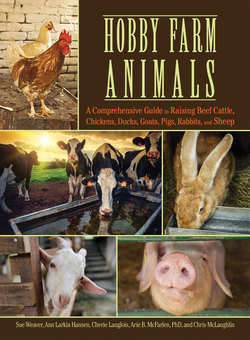Читать книгу Hobby Farm Animals - Chris McLaughlin - Страница 19
На сайте Литреса книга снята с продажи.
Internal Parasites
ОглавлениеMany different types of worms like to live inside cattle. The most common parasites are roundworms, lung worms, liver worms, liver flukes, and pinworms. Most cattle owners treat with dewormer medication once or twice a year: either in early spring, before grazing starts; in late fall, after grazing is done for the season; or at both times. For the most effective worm control, discuss with your veterinarian the best time of year to deworm in your area and how to rotate deworming medicines for better results. Worm medicine is widely available at farm-supply stores and from your veterinarian. It is either poured along the back or injected.
Concern has risen about the increased resistance of internal cattle worms to available medications, and some veterinarians are recommending that cattle not be treated unless worms are really causing a problem. Worm infestation levels are calculated by taking a manure sample and examining it under a microscope for worm eggs, something that can be done only by your veterinarian (although you need to collect the sample). It’s easier to first keep a close watch for external signs of a worm problem—weight loss and a dull coat in the summer (lacking the smooth, glossy shine).
Another common internal parasite is cattle grub, the immature stage of heel flies. They live inside cattle until they become adults and then emerge by drilling holes in the hide of their host. Timing of treatment is crucial to controlling cattle grubs and varies by region. Talk with your veterinarian.
Because internal worms are transmitted by eating grass infected with worm eggs from previous manure deposits, it’s possible to reduce worm infestations by managing pasture rotations. Don’t return cattle to a paddock until worm eggs deposited in the manure from their last rotation have had time to mature and die. For specific information on the life cycles of different worm species (which vary somewhat by moisture and temperature), consult your veterinarian or university extension service.
Some level of internal parasites is almost inevitable in pastured cattle, but it’s usually not a problem unless the infestation is affecting a cow’s general health and reducing her resistance to other diseases or slowing weight gain. Gear your treatment to both the nature and the extent of the problem.
